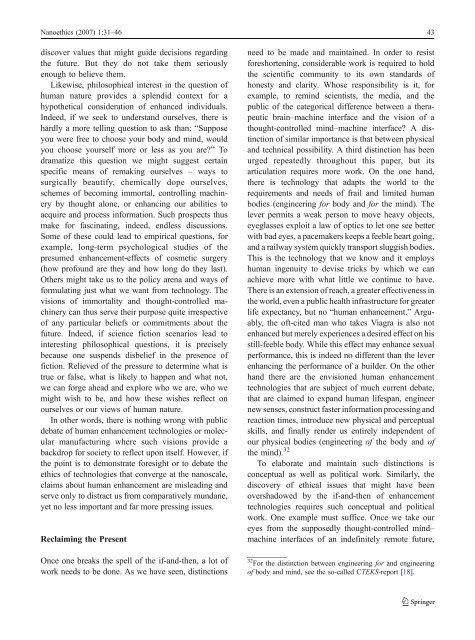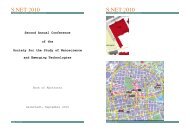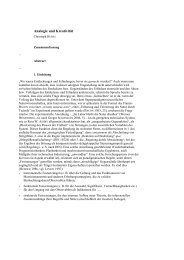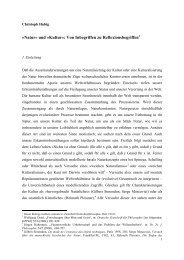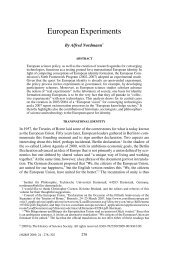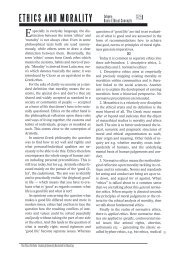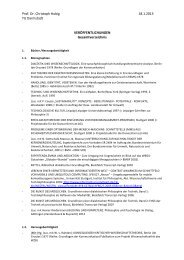If and Then: A Critique of Speculative NanoEthics - Common Sense ...
If and Then: A Critique of Speculative NanoEthics - Common Sense ...
If and Then: A Critique of Speculative NanoEthics - Common Sense ...
You also want an ePaper? Increase the reach of your titles
YUMPU automatically turns print PDFs into web optimized ePapers that Google loves.
Nanoethics (2007) 1:31–46 43<br />
discover values that might guide decisions regarding<br />
the future. But they do not take them seriously<br />
enough to believe them.<br />
Likewise, philosophical interest in the question <strong>of</strong><br />
human nature provides a splendid context for a<br />
hypothetical consideration <strong>of</strong> enhanced individuals.<br />
Indeed, if we seek to underst<strong>and</strong> ourselves, there is<br />
hardly a more telling question to ask than: “Suppose<br />
you were free to choose your body <strong>and</strong> mind, would<br />
you choose yourself more or less as you are?” To<br />
dramatize this question we might suggest certain<br />
specific means <strong>of</strong> remaking ourselves – ways to<br />
surgically beautify, chemically dope ourselves,<br />
schemes <strong>of</strong> becoming immortal, controlling machinery<br />
by thought alone, or enhancing our abilities to<br />
acquire <strong>and</strong> process information. Such prospects thus<br />
make for fascinating, indeed, endless discussions.<br />
Some <strong>of</strong> these could lead to empirical questions, for<br />
example, long-term psychological studies <strong>of</strong> the<br />
presumed enhancement-effects <strong>of</strong> cosmetic surgery<br />
(how pr<strong>of</strong>ound are they <strong>and</strong> how long do they last).<br />
Others might take us to the policy arena <strong>and</strong> ways <strong>of</strong><br />
formulating just what we want from technology. The<br />
visions <strong>of</strong> immortality <strong>and</strong> thought-controlled machinery<br />
can thus serve their purpose quite irrespective<br />
<strong>of</strong> any particular beliefs or commitments about the<br />
future. Indeed, if science fiction scenarios lead to<br />
interesting philosophical questions, it is precisely<br />
because one suspends disbelief in the presence <strong>of</strong><br />
fiction. Relieved <strong>of</strong> the pressure to determine what is<br />
true or false, what is likely to happen <strong>and</strong> what not,<br />
we can forge ahead <strong>and</strong> explore who we are, who we<br />
might wish to be, <strong>and</strong> how these wishes reflect on<br />
ourselves or our views <strong>of</strong> human nature.<br />
In other words, there is nothing wrong with public<br />
debate <strong>of</strong> human enhancement technologies or molecular<br />
manufacturing where such visions provide a<br />
backdrop for society to reflect upon itself. However, if<br />
the point is to demonstrate foresight or to debate the<br />
ethics <strong>of</strong> technologies that converge at the nanoscale,<br />
claims about human enhancement are misleading <strong>and</strong><br />
serve only to distract us from comparatively mundane,<br />
yet no less important <strong>and</strong> far more pressing issues.<br />
Reclaiming the Present<br />
Once one breaks the spell <strong>of</strong> the if-<strong>and</strong>-then, a lot <strong>of</strong><br />
work needs to be done. As we have seen, distinctions<br />
need to be made <strong>and</strong> maintained. In order to resist<br />
foreshortening, considerable work is required to hold<br />
the scientific community to its own st<strong>and</strong>ards <strong>of</strong><br />
honesty <strong>and</strong> clarity. Whose responsibility is it, for<br />
example, to remind scientists, the media, <strong>and</strong> the<br />
public <strong>of</strong> the categorical difference between a therapeutic<br />
brain–machine interface <strong>and</strong> the vision <strong>of</strong> a<br />
thought-controlled mind–machine interface? A distinction<br />
<strong>of</strong> similar importance is that between physical<br />
<strong>and</strong> technical possibility. A third distinction has been<br />
urged repeatedly throughout this paper, but its<br />
articulation requires more work. On the one h<strong>and</strong>,<br />
there is technology that adapts the world to the<br />
requirements <strong>and</strong> needs <strong>of</strong> frail <strong>and</strong> limited human<br />
bodies (engineering for body <strong>and</strong> for the mind). The<br />
lever permits a weak person to move heavy objects,<br />
eyeglasses exploit a law <strong>of</strong> optics to let one see better<br />
with bad eyes, a pacemakers keeps a feeble heart going,<br />
<strong>and</strong> a railway system quickly transport sluggish bodies.<br />
This is the technology that we know <strong>and</strong> it employs<br />
human ingenuity to devise tricks by which we can<br />
achieve more with what little we continue to have.<br />
There is an extension <strong>of</strong> reach, a greater effectiveness in<br />
the world, even a public health infrastructure for greater<br />
life expectancy, but no “human enhancement.” Arguably,<br />
the <strong>of</strong>t-cited man who takes Viagra is also not<br />
enhanced but merely experiences a desired effect on his<br />
still-feeble body. While this effect may enhance sexual<br />
performance, this is indeed no different than the lever<br />
enhancing the performance <strong>of</strong> a builder. On the other<br />
h<strong>and</strong> there are the envisioned human enhancement<br />
technologies that are subject <strong>of</strong> much current debate,<br />
that are claimed to exp<strong>and</strong> human lifespan, engineer<br />
new senses, construct faster information processing <strong>and</strong><br />
reaction times, introduce new physical <strong>and</strong> perceptual<br />
skills, <strong>and</strong> finally render us entirely independent <strong>of</strong><br />
our physical bodies (engineering <strong>of</strong> the body <strong>and</strong> <strong>of</strong><br />
the mind). 32<br />
To elaborate <strong>and</strong> maintain such distinctions is<br />
conceptual as well as political work. Similarly, the<br />
discovery <strong>of</strong> ethical issues that might have been<br />
overshadowed by the if-<strong>and</strong>-then <strong>of</strong> enhancement<br />
technologies requires such conceptual <strong>and</strong> political<br />
work. One example must suffice. Once we take our<br />
eyes from the supposedly thought-controlled mind–<br />
machine interfaces <strong>of</strong> an indefinitely remote future,<br />
32 For the distinction between engineering for <strong>and</strong> engineering<br />
<strong>of</strong> body <strong>and</strong> mind, see the so-called CTEKS-report [18].


